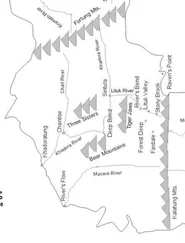Now time, your old torturer, changes color. There aren't enough hours in the day to digest what the Frenchman tells you and to think up replies. You hurry through your words, stumbling, losing count of your clicks, starting all over. You spin in torment as he types, willing him to hurry, fearing that each breathless pause means discovery.
You never dreamed that words took such numbing redundancy. You invent a code for "et cetera," faster and shorter than your original "do over," which Junot picks right up on. Improvements come piecemeal, improvised. You spend nights inventing whole new codes, drastically more efficient in their transmission. But their rules would take days to convey. And you can't stop saying things long enough to streamline their saying.
Tick by tick, teaspoon by teaspoon, talk returns you to its appalling density. You communicate daily, but never more than a handful of words at one go. Completing a simple dialogue takes a week. Sometimes you go a night without hearing from him, awful interludes in which you toss on your bed like a cheated lover.
Junot says that the English churchman sent to negotiate for the hostages' release has himself been taken, perhaps even killed. The news is at least half a year old, but it hits you with the force of a wire flash. He says the Syrians have occupied West Beirut, putting an end to the city's anarchy.
But not, you reply, a bitter day later, to the war. You ache to cut through the waste of politics and ask him about the good stuff. What's new in music? Who won last year's Series? Any out-rageousness at the Oscars? He can't know, and you don't ask. Nor can you give him the diversion he must crave.
You share all the insights of your protracted stay, the names of all the guards you have garnered, their assorted psychopathologies and soft spots. You learn of your awful luck.
Junot has begged for reading matter but has not yet gotten a single scrap. You tap out short surahs from the Qur'an for him, like singing in the dark after bedtime, delighting in written syntax all over again. All the while you live in danger of detection.
What you could not do for yourself you rise to do for him. Release can't be long in coming, you tell him. All the rational evidence is on your side. The two of you: each other's confidant, each other's clinical physician, each other's clown. You lie for hours at night, giggling at his ridiculous shaggy-dog jokes, the ones that take three days to get to their belated punch lines. The ones that open with the telegraphic formula: Three. Tourists. Chinese. Indian. American.
One day, the line goes dead. It seems at first a minor annoyance. You've suffered interruptions before. Some guard has almost caught him, and he must lie low for a cooling period. Or he is on some protracted punishment, restricted to his chain.
For a while you tap on into the darkness, hoping he can still hear you. But long silence wears away the sense of anything at all on the far side of the barrier. This Frenchman has let you down, has raised your hopes, then hung you out to dry. Your daily dispatches get shorter, more perfunctory. You want to save the good stuff for his return, when you can hear his live reaction.
The day comes when you admit Junot will not be back. You say freedom. You say release, although there are more frugal explanations. This abandonment makes last spring's hopelessness seem like a mercy killing. You hate the man, for reviving desire and all its gruesome reminders. For telling you that you persist in the world's memory.
His words are no better than those pieces of fruit that Ali sadistically tosses, just out of reach.
In your dreams these nights, you lean out through a bright, open window. But the window sash falls like a blade on the back of your neck, as crisp as that old French political expedient. Joy looks out on all that it is not, your book says. But bitterness sees only itself.
Sayid brings you your supper late one evening, some day in what must be late August. The air wears that oppressive stillness, but here it is not so stultifying as the city was, this time last year. Your country estate, the subtle shifts of its noise and breezes, has blessed you in a million ways, all powerless to make any difference. Sayid comes to bring you your usual plate of gristle, and you hear him weeping. It stuns your ear to learn of a grief that isn't yours. In its strange depths, his pool of sadness at once dissolves yours.
What in all the world can this bewildered, accepting soul have to weep about? His suffering twists the air around him. You cannot help yourself; some dead root in you, left over from years ago, twitches in this rain. You want to know what happened. So long as you live, it will hook you, the hint of word. You hear him set down the plate and back out to go. He, too, will leave you without disclosing the source of his bitterness. Then a discovery larger than your life: you can just ask him.
"Sayid." The movement stops, but not the muffled sorrow. "Sayid. What is it? What has happened to you?"
He searches for a way through his loss. "Hussein." Unsure how to go on. "Hussein is dead."
Some family member or close friend. Another victim of this eternal
civil suicide.
"I'm… so sorry. When? When did it happen?"
The question baffles him. "When? At Karbala!" A thousand and a third years ago.
Pity, astonishment, and disgust — the whole grab bag given the human animal — pass through you in quick succession. But the flood of feeling recedes with Sayid, leaving behind only a single, sharp thrill. You know what day it is.
For the first time in months, you can locate yourself in time. Today is Ashura, the anniversary of the ancient sacrifice. The tenth day of Muharram, the month of mourning. Some quick thought and the application of your mother's formula produce the year: 1409.
But when is 10 Muharram? You spend the rest of the month — both months — worrying the problem. Like trying to derive the quadratic formula too many years after high-school algebra. The moon and the sun deny each other's cycles. By the time you conclude that mental conversion is impossible, you've lost count again, in any calendar.
You wake from a deep sleep, a creature gnawing at your face. You scream and spasm, sending some kind of beaked mammal flying across the floor. The guards ignore you, used to your nighttime apparitions.
But this beast is real. It glares at you from the corner where you've whacked it. You make it out: a mouse, feral and sniffing, no longer than your thumb, although a little fatter. Ounce for ounce, it looks at least as needy as a human. But infinitely more harmless.
The scared gray thing gives you a project to absorb another winter. It takes weeks to overcome your bad first impression and win her trust. You surrender the best scraps of each meal, always more than you can afford. In your moments off the chain, you leave stockpiles as far from human contamination as possible. When she comes out to examine the stash, helpless in the tug of its aroma, the human giant is there, lying still, just looking on, passive and given.
Each feeding station that she accepts gives way to another, imperceptibly closer to the giant's base camp. Desensitization takes forever, but it's precisely forever that you have on your hands. You've forgotten what it means to work steadily toward some goal. By the time she'll come within ten feet of you, she already forms your unwitting solace, your joy, your day's significance.
But she remains skittish as the day is long. Something about the disparity in your sizes. Something about being smacked across the room before formal introductions. There comes a day when she'll nibble just outside arm's distance. You're too ashamed to admit the name you've already given her, even to yourself, even at night when she wriggles her nose, inquiring, at your motionless body.
Читать дальше












